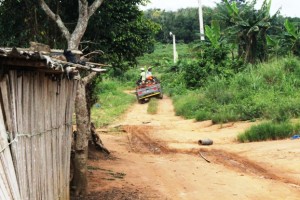Valery Giscard d'Estaing Boulevard
Building GANAMET
Rural areas: local development issue in Africa
70% of poor people in sub-Saharan Africa live in rural areas, which forces nations in this region to place a heavy emphasis on rural policy. Policy goals include increased agricultural productivity and improved rural incomes, as well as prudent management of natural resources and climate resilience–necessary not only for the agricultural economy, but also for the tourism sector in much of Africa. These are all closely linked, yet public policies are often developed and implemented independently rather than as part of a broad, integrated strategy. In order to successfully implement integrated landscape management in rural Africa, a set of policy-enabling conditions must be set.
Alignment of sectoral policies and strategies at local and national levels is a key challenge. The roles of governments, local groups and NGOs should be clearly defined and executed. Governments can provide farmers with support for training and extension services, inputs, and market coordination to incentivize more sustainable agricultural practices. Integrated landscape management (ILM) strategies can be used to meet multiple national goals in international policy processes and a multi-objective landscape framework can provide efficiencies to countries as they work to meet their commitments under international environmental agreements. Urban and rural policies can and should be linked in order to facilitate truly integrated management practices. Supportive public investments in ‘green’ infrastructure such as road, rail, energy, storage and dam construction are also needed to lay the foundations for integrated landscape management. Finally, Africa needs more of its own centers of expertise for evidence-based policy analysis that creates the knowledge base for the implementation of ILM. Policymakers and landscape stakeholders also need additional expertise in monitoring the effectiveness of various landscape policy approaches.
Read more on blog.ecoagriculture.org



